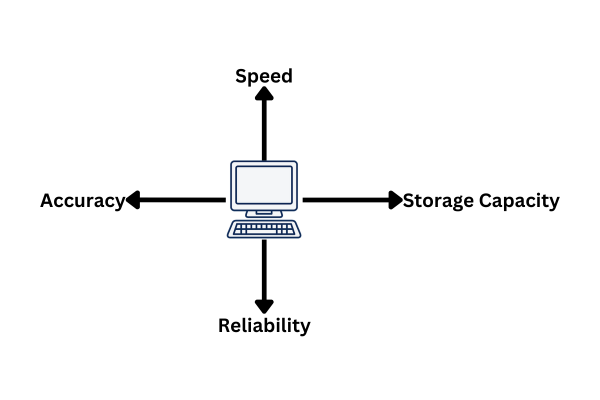Computers are central to modern life, transforming nearly every aspect of how we work, learn, and play. The applications of computers are vast, from revolutionizing education and healthcare to advancing scientific research and entertainment. In this blog, we will explore the various applications of computers and how they continue to shape our world.
Key Characteristics of Computers That Fuel Their Versatility
Computers are more than just machines; they are versatile tools that perform complex tasks with speed and precision. Below are some key characteristics that contribute to their wide-ranging capabilities:

- Speed: Computers process data and perform calculations at incredible speeds, far surpassing human capabilities.
- Accuracy: With meticulous precision, computers minimize errors, ensuring reliable results.
- Storage Capacity: Computers can store vast amounts of information, from text and images to videos and complex data sets.
- Reliability: Built for consistent and dependable operation, computers handle repetitive tasks without fail.
Top 10 Applications of Computers Across Industries
1. Education
- Computer-Based Training (CBT): Interactive learning modules and simulations enhance student engagement and knowledge retention.
- Online Learning Platforms: Provide flexible and accessible education opportunities for learners of all ages.
- Research and Collaboration Tools: Facilitate information gathering, data analysis, and collaborative projects.
2. Healthcare
- Diagnosis and Treatment: Advanced imaging technologies like CT scans and MRIs rely on computers for precise visualization.
- Medical Records Management: Electronic Health Records (EHRs) streamline patient information and improve healthcare delivery.
- Research and Drug Development: Computers aid in analyzing complex biological data and simulating drug interactions.
3. Business and Finance
- Accounting and Bookkeeping: Software automates financial tasks, improving accuracy and efficiency.
- Data Analysis: Businesses use computers to analyze market trends, customer behavior, and operational performance.
- Online Banking: Customers can manage finances, pay bills, and transfer funds conveniently from anywhere.
4. Entertainment
- Gaming: Computers power immersive gaming experiences with stunning visuals and complex simulations.
- Multimedia Production: Editing software allows for the creation of high-quality videos, music, and other digital content.
- Streaming Services: Deliver on-demand entertainment content to viewers around the world.
5. Science and Engineering
- Simulations and Modeling: Computers enable researchers to simulate complex systems, from weather patterns to chemical reactions.
- Data Analysis and Visualization: Complex scientific data can be processed and visualized to reveal hidden insights.
- Design and Prototyping: Engineers use computer-aided design (CAD) tools to create models and prototypes of new products.
6. Transportation
- Navigation Systems: GPS technology guides drivers and pilots, optimizing routes and enhancing safety.
- Traffic Management: Intelligent transportation systems use computers to monitor and control traffic flow, reducing congestion.
- Autonomous Vehicles: Computers are at the heart of self-driving cars, promising a future of safer and more efficient transportation.
FAQs: Applications of Computers
Q: How are computers used in space exploration?
A: Computers control spacecraft, analyze data from probes and telescopes, and simulate space environments for training astronauts.
Q: Can computers replace humans in the workplace?
A: While computers can automate many tasks, they lack the creativity, critical thinking, and emotional intelligence of humans. The future likely lies in collaboration between humans and machines.
Q: How can computers help address climate change?
A: Computers model climate patterns, optimize energy usage, design more efficient systems, and analyze data to support environmental research.
Q: What are some emerging applications of computers?
A: Artificial intelligence (AI), machine learning, virtual reality (VR), augmented reality (AR), and quantum computing are just a few areas where computer applications are rapidly evolving.
Conclusion
The applications of computers are expanding at an unprecedented rate, impacting industries ranging from education and healthcare to entertainment and transportation. As technology continues to advance, the possibilities for computer applications will only grow, creating new opportunities and challenges for every sector.